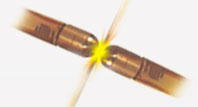Industrial Use Molybdenum
Spot Welding Spares
Industrial Use Molybdenum
Molybdenum metal is used in:
Molybdenum Metal
Molybdenum is a refractory metal typically used in high temperature applications. Key properties include:
- Low co-efficient of thermal expansion (5.1x10-6 m/m/°C) which is about half that of most steels
- Good thermal conductivity
- Good electrical conductivity
- Good stiffness, greater then that of steel (Young's Modulus 317MPa)
- High melting point (2615°C)
- Good hot strength
- Good strength and ductility at room temperature
- High density (10.2 g/cm3)
Its ability to withstand high temperatures and maintain strength under these conditions are responsible for the fact that molybdenum finds most of its application at elevated temperatures. In fact, it can work at temperatures above 1100°C (in non-oxidising conditions), which is higher than steels and nickel-based super alloys. When exposed to temperatures in excess of 760°C in air rapid oxidation can result. Under these conditions, the oxide layer sublimes and the base metal is attacked. Thus, molybdenum performs best in inert of vacuum environments.





